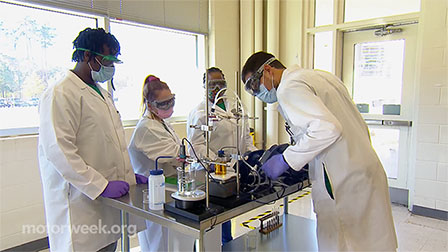Dec. 15, 2021
Students Whip up Biodiesel in South Carolina (Text Version)
This is a text version of the video segment Students Whip up Biodiesel in South Carolina, which aired on Dec. 15, 2021.
JOHN DAVIS: With so much focus on the development of electric cars these days, it’s easy to overlook some of the tried and true clean fuels that are still making a positive impact on our environment; but, we recently visited a group of alt-fuel all-stars who are fueling their future with biodiesel.
Blythewood High School serves about 2000 students in rural Richland County, South Carolina. Typical of the area, it offers a few vocational classes in agriculture, construction and mechanics; but this chemistry course is anything but typical. These students are learning how to make biodiesel from donated used cooking oil.
This unique curriculum is the brainchild of Will Epps, a science teacher here who identified a need in the local job market and sought a solution.
WILL EPPS: In the summers, I work as a chemist at Westinghouse and what I noticed is that, in the lab space, there was a lot of turnover with technicians. And, I was, as a chemistry teacher and kind of being one foot in both worlds, it kind of dawned on me and I was thinking well, why can’t we train high school kids to have this job? Noticing that what we’re doing in a chemistry class, they need a little bit extra to be successful in that environment.
JOHN DAVIS: Pairing that idea with some basic equipment found at the school, Will got the biodiesel program up and running a couple of years ago.
It’s been expanding ever since and recently earned a grant from the South Carolina Energy Office through the US Department of Energy’s State Energy Program, with additional help from Palmetto Clean Fuels, South Carolina’s Clean Cities coalition. But, it’s really Will’s infectious enthusiasm that draws students to the class.
AVA: I wanted to get involved in this program because I had, uh, Mr. Epps as a teacher before, and he was a really great teacher, and he convinced me that I was good at science and that I could continue being in science classes because I was previously a little bit insecure about my abilities with science.
CAMDEN: And also, I like doing the work. The work’s pretty - it’s complex, but easy at the same time. It gets your brain, you know, pumping.
TESSA: And, it being more, like, out there and being more, like, project-based instead of just like papers and stuff, I’m like, “That could be an interesting class to go into.”
JOHN DAVIS: In this lab, students not only learn the basics of chemical reactions, but also gain over 100 hours of laboratory experience; enough to help them qualify for chemical engineering and other lab internships at local companies.
WILL EPPS: It’s a great product. You know, it’s simple enough for students to understand. You know, we mix two things together and we get a product that separates out, and then we have a lot of analytical chemistry techniques that we need to prove that the fuel is good enough quality to go in an engine. So, it kind of fits both worlds, um, and it’s really nice to be able to take a waste product and change it into something that we can use again.
JOHN DAVIS: The student-made fuel is currently being tested in the school’s tractors and by diesel truck owners in the local community, with great results. But the ultimate goal is to top off their own buses with a cleaner blend of B10 or B20 biodiesel made right at the school.
WILL EPPS: So the plan right now, and where we’re at, is that we can make 40 gallons of B100 in a week, and so the goal is to maybe double or triple that capacity over the next couple of years. And, you know, really our product is the biodiesel, but really the product is our students and getting them into the workforce and being successful.
AYDEN: Well, now I’m really interested in chemistry.
KATRELL: I’m happy we can, you know - we’re doing at least a little something to help.
TY: I know where we’re going right now is not the best, but if we can do any amount to help it, then that’s what I’m all for.
TYLER: It’s just a really cool thing to be a part of, saying “Hey, you see that bus driving? I helped fuel that.”
JOHN DAVIS: Gaining a healthy respect for the environment, to go along with invaluable hands-on experience, these students are literally fueling a clean driving future for all of us.
